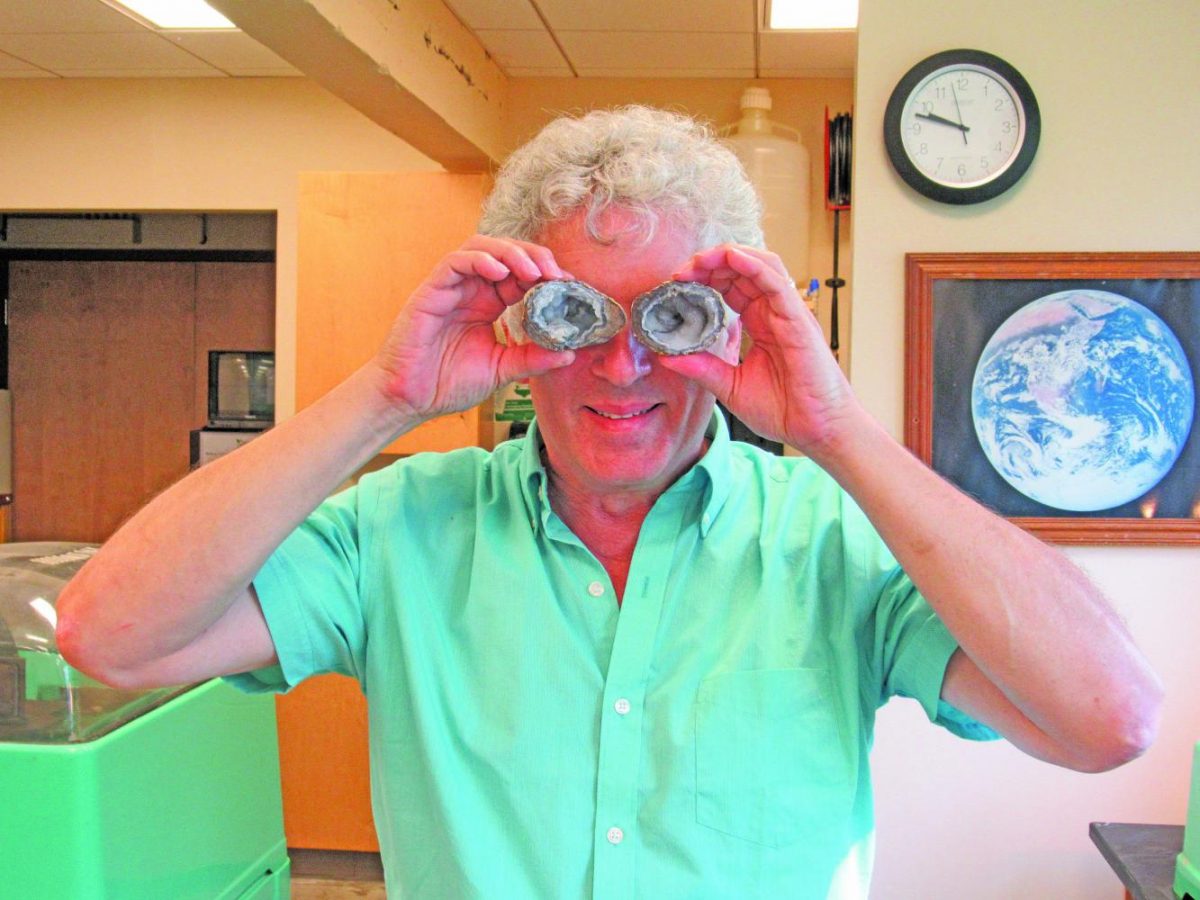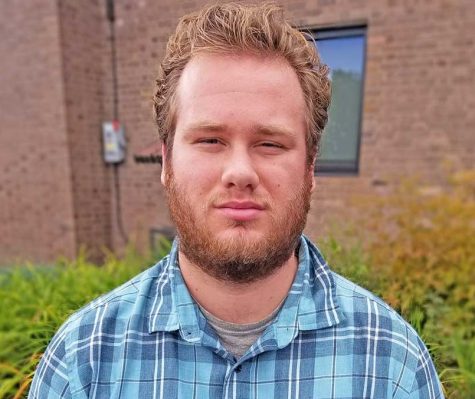Rocks in His Head
Les Kanat
Leslie Kanat, professor of geology in the Department of Environmental and Health sciences, has taught at JSC since 1989 after receiving a Ph.D. in earth sciences at Cambridge University.
How did you end up in Cambridge?
I ended up in Cambridge because of the work I was doing as a master’s candidate. The University of Cambridge became aware of what I was doing and they said, “Have you considered coming to Cambridge to get you Ph.D?” I hadn’t considered that, but once the offer was made, I considered that. I applied for a Fulbright scholarship, which I got for two years, and an overseas research student award, which basically meant that I had no bills to pay when I went to Cambridge. I got there because they were aware of what I was doing as a master’s candidate and asked.
As a geologist, where is the most fascinating place you have ever been?
There have been many. Probably the number one would be Spitsbergen. It’s a little group of islands right by the North Pole. It’s north of northern Norway, northeast of Greenland. It’s the northern most landmass. So I’ve been up there for three seasons, 10 weeks at a time, and it’s a pretty spectacular place because you are basically there alone, there is no one else there. It ranks as the most unusual, beautiful, and remote places that I’ve ever been. We would live in tents, basically would get dropped off by a ship and would just pick you up ten weeks later, and you got everything you would need for ten weeks. We would do geological field mapping, identifying the orientation and the type of rocks that make up the mountains.
What are you experiences in music, specifically punk rock?
I wouldn’t consider myself a punk rocker, I would say I am musically hopeless. There used to be, a few years ago, a math professor who is no longer here; a bryologist, someone who would study sphagnum; Gustav Verderber and Bob Genter who are still here as biologists. The five of us used to go make music three nights a week down in East Johnson. We would have a nice dinner amongst friends and make a lot of music. I wasn’t any good playing instruments, so they bought me a harmonica and a tape called “Harmonica for the Musically Hopeless,” and I would try to learn harmonica every day on the way to the college so that at night, when we would get together and hang out, we could make music. I told them, the only time I have time to practice is when I am driving and Gustav said, “You can’t be holding the harmonica in your hand while you are driving in, shifting gears!” So then he bought me one of those harnesses that holds the harmonica. Years of this went on, and still to this day, I am musically challenged. I can still have fun with people making music. I like listening to music. Some of the punk music I thought was good, I liked jazz, I like classical. I like most types of music. I don’t like country music. My wife is from Texas, she likes country music.
What are your favorite courses to teach and why?
My favorite courses to teach are based upon the type of course, not necessarily the content. For example, courses that allow me to be outdoors in the field, or in the lab doing something, are more fun than sitting in front of a classroom and having some sort of dialogue with students. I would say by far my favorite course to teach is Field Geology. We meet three times a week, out in the field and in the lab. There is basically no lecture and a lot of projects. That’s a lot of fun. I also like to teach the Intro to Earth Sciences course, because although that has a lab and field component, it is a lot of in the classroom dialogue. What I really like about that course is that people go like, “Wow! I never thought of that! Oh my God, that’s how things work?” That’s a good type of feeling, I like that. Those are probably my two favorite courses, but then again, I also have a course called Current Topics in Science — we meet every Wednesday, got about 60 students in that class. We invite a new speaker to the college every week to talk about what’s going on. We always go out to dinner with the speaker afterwards. What I like about that course is I get to meet cool people doing research in all different types of areas to come to the college, say this is what they do, and maybe get our students involved with what they do. I love doing that too, it’s a lot of fun.
What is the crucial issue facing the planet today?
The lack of understanding of differences between people and the lack of understanding of how things work. Both on the social scale and on the science scale. If we understand how things work, there are a lot of issues that could be easily resolved if we also understood how people think.
What would be three things you would do as the President of United States?
I would seek guidance from brilliant people, and I would do that again and again. That’s probably what I would do. I would talk to people who are thoughtful, who understand social dynamics, who understand science, who understand how the world works, and use their guidance to make decisions based upon what the data tells us. For one person to say “I know what I’m going to do because I’m right” — you might be right in your own mind and in your own reality, but your own reality might not represent really how the world works and what’s going on. I don’t think that’s right. I think the way is to figure out how the world works, figure out how people interact [and] look at what the big problems are, and one person can’t do that. Especially if you make yourself successful and you think you can help others, and you turn the world into something we have right now with our current administration is the wrong move.
What five people, living or dead, would you attend a dinner party with?
Barack Obama would be a lot of fun. He’s smart, he’s fun, he’s been out there, I think I would learn a lot from him. Stephen Hawking, I have had dinner with him several times but I would do that again. He is also from Cambridge at Keys College where I was at. He was a fellow, still is a fellow at Caius College, and the graduate students would have dinner with the fellows regularly and Stephen would show up occasionally. I wasn’t in any of his classes, and when I knew him, it was before he had his voice box. But he had his graduate students who would communicate his utterances so that others would understand him. I would ask him a question and he would mumble back and his graduate students would help him respond. It was really cool. George Church I would like to have dinner with. He is one of the leaders in synthetic biology and genetic manipulation. He’s got like 50 companies that he has started up about how we can force evolution. I’ve always been fascinated by Pablo Picasso as an artist, as a scientist, as a visionary. Finally, I would love to have dinner with my wife.
What’s your favorite rock?
I don’t have any pet rocks, but there are some categories of rocks that I really like. I find highly deformed sedimentary rocks are cool. I also like jadeite bearing psammites but those are two categories of rocks I like. They occur under extreme conditions of extremely high pressure at low temperature, very rare.
How would you describe your teaching style?
Challenging and helpful. I like to guide people in order for them to figure things out for themselves, because if I just tell them “this is how you do it” then they will just do it and they won’t figure things out for themselves. I think that education is a gift and I enjoy working with students who want to learn. I get really excited when I talk about geology so I end up talking really quickly. I really like to figure out how things work and help others figure out how things work and why they are the way they are. I just give students opportunities to show what they can do. I’m really critical on how people speak in class. In my advanced classes, they don’t say “like” or “you know.” I’ll just cut them off. I’m really picky about their writing style and how they present themselves on paper and when they stand up to make a presentation. Picky, challenging and helpful.
What would be your last meal?
I really like pizza. Good beer and pizza. There’s a place in Burlington that makes great pizza, Pizzeria Verità. I would want to go there for my last meal.
What kind of rock would be your tombstone and what would it say?
I think cremation is the way to go, so I don’t think I would have a tombstone or headstone. I would like the ashes to be dispersed somewhere. I would tell my wife to cremate me and flush me down the toilet and she’s like, “I’m not doing that!”
What do you want your legacy to be?
There’s a quote sometimes attributed to Robert Wesley Powell. It goes something like, “Do all the good you can for all the people you can for as long as you can.” I like that motto. I try and live that way. I would want my legacy to be that I would want my friends and family to smile when they think of me.








Cousin Ronnie • Oct 3, 2017 at 8:10 pm
Dear les and Lanie,
I am very proud of both of you. The article gave me much insight into Les, which was fantastic. I also had the pleasure of reading an article about Amy yesterday. Although we live states apart and rarely see each other, I wish you both, my dearest cousins to know just how much I love you and wish we lived closer.
Much love,
Your second cousin, Ronnie from
BALTIMORE
Lanie Kanat • Oct 3, 2017 at 9:52 am
I’m a lucky woman.